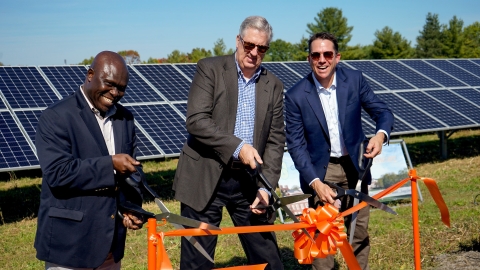
Bucknell Repeats STARS Gold Rating for Sustainability
July 13, 2023
Victor Udo, director of campus sustainability, President John Bravman and Chad Farrell '92, founder and CEO of Encore Renewable Energy, (L to R) dedicate the Bison Solar Project on Oct. 6, 2022. Photo by Jackie Kerley '23
Bucknell University has repeated a STARS Gold rating and received a higher score than its 2019 rating in recognition of its sustainability achievements from the Association for the Advancement of Sustainability in Higher Education (AASHE). STARS, the Sustainability Tracking, Assessment & Rating System, measures and encourages sustainability in all aspects of higher education.
Bucknell's report is publicly available on the STARS website. The University improved its score this year to 66.75 from 65.59 in 2019.
Since the 2019 rating, Bucknell has leveraged the Bucknell Farm and the creation of the Office of Campus Sustainability to enhance biodiversity and natural habitat, energy efficiency/carbon neutrality and waste minimization objectives found in the University strategic plan. The University has additionally developed a 10-year sustainability plan while simultaneously implementing key activities under the President's Sustainability Council (PSC) Working Groups.
The University continues to deploy sustainable technologies including a biodigester that diverts food waste from the landfill. As reported by Second Nature — an organization committed to accelerating climate action in, and through, higher education — the University has reduced its carbon footprint by nearly 30% from its 2008 baseline.
"This rating demonstrates Bucknell's progress in advancing sustainability in higher education despite the challenges we faced during the COVID-19 pandemic," wrote President John Bravman in the cover letter for Bucknell's report. "In each coming year, we will enhance our reporting practices and build upon the initiatives already in place. This will not only increase our scoring in the STARS report, but it will also reduce our overall impact and move us closer to our committed goal of carbon neutrality."
"We have a [sustainability] plan and we're working on projects and doing them at the right time. So we're on the right track [to meet the sustainability plan commitment of achieving carbon neutrality by 2030] and not starting from scratch," says Victor Udo, director of campus sustainability. "We're building upon what we already have in place. Having the commitment from the president and the sustainability council is very important."
Bucknell sustainability leaders recently partnered with the borough of Lewisburg to produce a climate action strategy, with the goal to have a 50% reduction of greenhouse gas emissions from 2019 levels by 2035 and achieve net-zero emissions by 2050. Borough council members unanimously adopted the report following a two-year study and review of emissions data and policies. It was the third Local Climate Action Plan (LCAP) program Bucknell partnered on — the others included Shamokin and a consortium of governments in Montgomery County.

Maggie McConnell '22 and Taylor Lightman, the director of Lewisburg Neighborhoods, both were instrumental in developing the recently adopted climate action strategy in Lewisburg. Photo by Emily Paine, Communications
"Bucknell receives STARS credits for those LCAPs; our involvement improves our public engagement score," Udo says. "Bucknell is a living-learning community where our students learn from faculty and staff to become sustainability leaders in their communities and workplaces."
The current report did not include the completion of the Bison Solar Project, which started producing electricity in December. It was also submitted prior to the opening of the Bucknell Greenway Path, and the opening this fall of two new Bucknell West Apartments buildings, with the other two to be completed by fall 2024. The new buildings are being designed to include a geothermal heating and cooling system to advance the University's carbon neutrality commitment.
Udo expects Bucknell's rating to continue to rise by the time the University needs to submit its next AASHE STARS ratings report in 2026.
AASHE is the leading association for the advancement of sustainability in higher education. Established in 2005, it is comprised of over 900 members across 48 U.S. states, a U.S. territory, nine Canadian provinces and 20 countries. Its STARS program is the most widely recognized framework in the world for publicly reporting comprehensive information related to a college or university’s sustainability performance.

